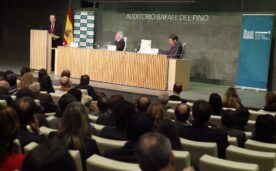On 20 February 2012, the Rafael del Pino Foundation hosted the Master Lecture entitled "Socio-political consequences of a stagnant economy. The dilemma of economic growth", delivered by Benjamin Friedman, William Joseph Maier Professor of Political Economy at Harvard University.
Benjamin Friedman argued that: "The current economic situation in a number of countries, including the United States, poses a serious danger to the health of Democracy. The experience of many countries around the world shows that one of the essential conditions underlining the health of democratic freedoms is that a majority of the population has a sense of advancement in the quality of life. I think the history of the last 150 years makes it clear that when that doesn't happen, when people lose optimism about their future, or lose confidence that their children will experience an improvement in their quality of life, there is an increase in social rigidity and democratic values are put at risk [...]. For the moment, what we have seen is a greater radicalisation of political opposition; in the US the Tea Party has appeared and, in France, this would explain the apparent strength of the National Front as an example of political organisations whose programme does not go beyond opposition to what the government says and the increase in social rigidity", but he warns: "History also teaches us that a social explosion cannot be ruled out".
Benjamin Friedman considered that the weight of the public sector in the economy is not at the root of the economic crisis: "The real problem lies in imbalances in financing, both in the public sector - the European example of countries that have overspent their revenues - and in the private sector - where, in the United States, both households and financial intermediaries over-leveraged. The issue is not the size of the public sector of an economy relative to the size of the private sector. The main issue is whether financing equals spending on a sustained and continuous basis over time. The people of a country can then decide what they prefer: a relatively small private sector, as in North America, or a larger private sector, as in Europe. Both positions are equally legitimate. I repeat once again: the problem is not the proportion in which the two sectors make up an economy, but how to maintain the balance between funding and spending in each sector.







